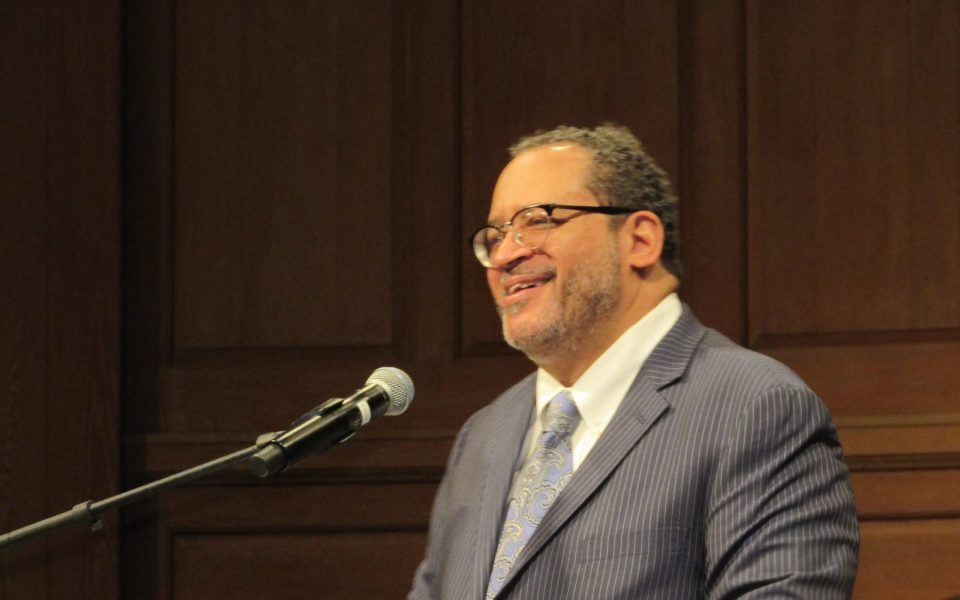Sociologist and author Michael Eric Dyson draws a line from Martin Luther King Jr.’s “I Have a Dream” speech to Colin Kaepernick taking a knee.
United by the tragedy of a young man’s death, two universities — one a public HBCU and the other a private, predominantly white institution — welcomed one of the preeminent scholars of the Rev. Martin Luther King Jr. on Monday evening.
Before the keynote speech, Wake Forest University President Nathan O. Hatch expressed regret about the murder of Winston-Salem State University student Najee Ali Baker, 21, who died after suffering from a gunshot wound on Wake’s campus in the early morning hours of Jan. 20.
Addressing about 1,500 people at Wake Forest University’s Wait Chapel on Monday, Michael Eric Dyson ditched the official speech title printed on the program, “On Common Ground: Where Do We Go From Here?” and announced a slightly more provocative header, “A Man Who Made America Great,” whose modesty conveyed a none-to-subtle dig at the current president
A professor of sociology at Georgetown University, Dyson has earned recognition as one of the world’s most important King scholars since the publication of his 2000 book, I May Not Get There With You: The True Martin Luther King Jr., which is regarded as reclaiming the late civil rights leader’s radical legacy. Dyson’s speech on Monday, which lasted just under an hour, moved from a soaring meditation on King’s preoccupation with the unfulfilled American creed that all people are created equal to devastating takedowns on current political hypocrisies. The scholar and popularizer enthralled his audience by riffing with equal ease on Beyoncé and theologian Paul Tillich and running a parallel commentary for the benefit of his college-aged audience, at one point briefly referencing rapper Future’s “F*** Up Some Commas” to elucidate a point on King’s “I Have A Dream” speech, before returning to language more attuned to the older people in the crowd.
“So he stood there and he challenged America to become great,” Dyson said. “Yes, the ideal was there, but it loomed on the horizon. The potential is always there, but you’ve got to work toward it; you can’t presume you have it in your grasp.”
Dyson’s speech broke the tension surrounding the United States’ continuing troubles over race relations by speaking plain truths directly to the black majority in the audience in a way that also allowed white listeners to come along. Scholarly insights and biting witticisms leavened with naked humor elicited both murmurs of agreement and uproarious laughter from the audience. Beyond scholarship and popular appeal, Dyson emulated his hero’s prophetic voice by challenging the notion that King’s vision of a beloved community doesn’t include LGBTQ people.
Dyson said a woman recently told him he was going to hell after he preached a sermon upholding the humanity of gay people at a black church.
“I said, ‘What’s wrong with your theology?’” Dyson recounted. “If you think they ain’t perfect, are you saying God ain’t perfect? You saying God created something that ain’t perfect? It ain’t my theology I’m worried about; it’s yours. Because if God made it, it’s good. God looked down on the earth, and said, ‘That’s good!’
Moving from righteousness to comedic scorn, Dyson eviscerated the notion that sex discrimination is qualitatively distinct from racism because LGBTQ people choose a “lifestyle.”
“I’ve got news for you: Some people have opted out of blackness,” he said. “They are no longer fully insured. So when they have collisions with race, they ain’t got no coverage.”
After wrestling with the parochial issue of homophobia in the black community, Dyson made a pivot to a more pervasive and enduring fact of American life — white supremacy, particularly the crippling idea revived by Donald Trump that Americanism is synonymous with whiteness. Dyson suggested that the currently sidelined NFL quarterback Colin Kaepernick represents King’s legacy of trying to perfect the unfulfilled promise of America’s creed.
“When he takes a knee, he’s not standing and kneeling against America,” Dyson said. “He wants America to be great. Mr. Kaepernick’s simply saying, ‘I want to draw attention to people who are unjustly killed as a result of police aggression.’ That’s not an assault on police officers that we appreciate when they exercise their just prerogative of defense in the name of the state with a badge and a gun. When it gets out of control, when it begins to metastasize like a cancer across the body politic, it must be stopped.”
Dyson also made an argument for class-interest politics, pleading that black and Latinx workers shouldn’t allow themselves to be pitted against each other by Trump’s xenophobic appeals, adding, “To the white working class: That man ain’t your friend.”
Black people at the advent of the Trump presidency face a double-bind, Dyson suggested.
“Isn’t it interesting this last election was supposed to be a referendum on the white working class?” Dyson asked. “And then they tell us to get over the identity politics? Do you see the contradiction?”
Join the First Amendment Society, a membership that goes directly to funding TCB‘s newsroom.
We believe that reporting can save the world.
The TCB First Amendment Society recognizes the vital role of a free, unfettered press with a bundling of local experiences designed to build community, and unique engagements with our newsroom that will help you understand, and shape, local journalism’s critical role in uplifting the people in our cities.
All revenue goes directly into the newsroom as reporters’ salaries and freelance commissions.


Leave a Reply